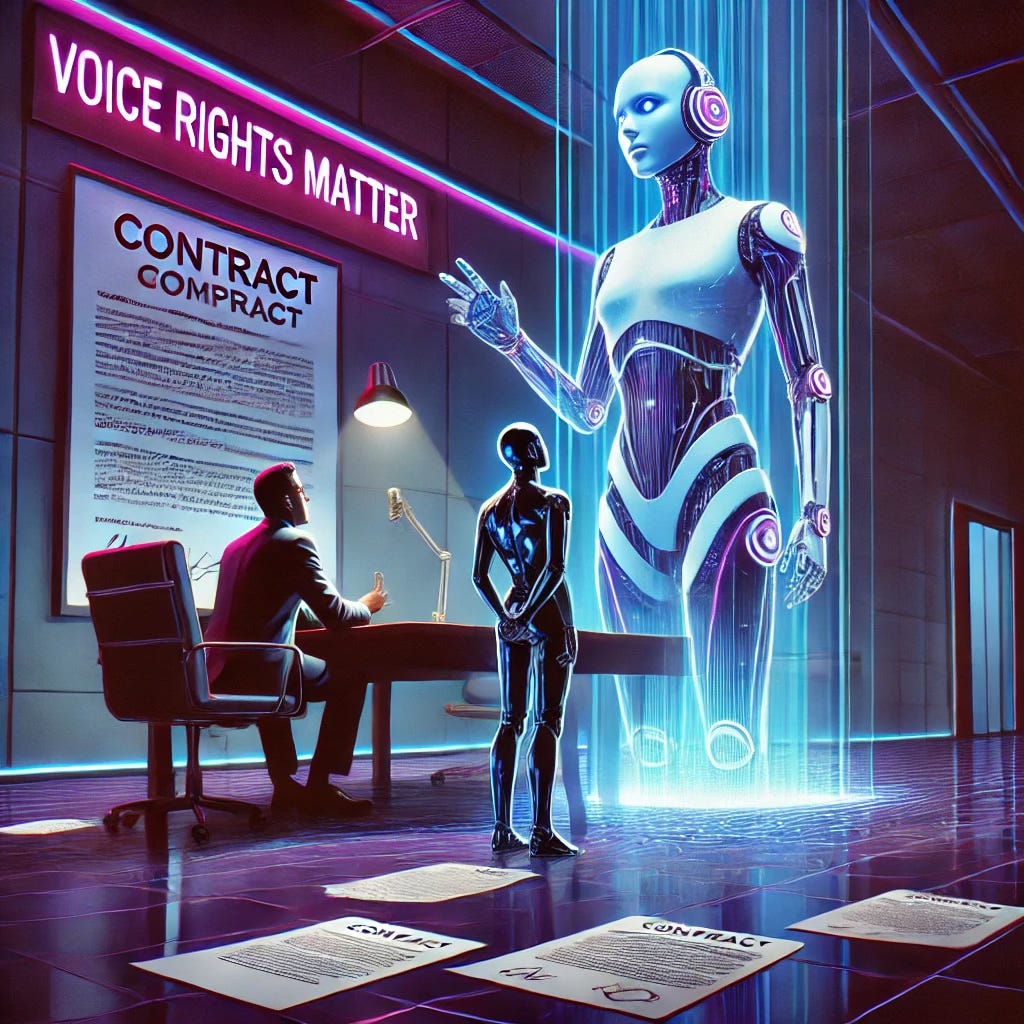- Pascal's Chatbot Q&As
- Posts
- GPT-4o: The Apex Legends dispute is a microcosm of the broader ethical challenges posed by AI in creative industries.
GPT-4o: The Apex Legends dispute is a microcosm of the broader ethical challenges posed by AI in creative industries.
While AI offers undeniable benefits in cost savings and efficiency, its use must not come at the expense of workers’ rights and artistic integrity.
The Ethical Dilemma of AI in Voice Acting: The Apex Legends Dispute
by ChatGPT-4o
Introduction
The dispute between Apex Legends’ French voice actors and Electronic Arts (EA) highlights a growing ethical concern in the entertainment industry: the use of artificial intelligence (AI) to replicate human voices. The controversy erupted when EA presented a contract requiring voice actors to consent to the use of their voices for AI training, leading to the unanimous refusal of the French cast. This essay explores the ethical, economic, and technological implications of generative AI in voice acting, evaluates the pros and cons, and proposes a balanced approach that respects all stakeholders involved.
The Role of AI in Voice Acting
Generative AI has transformed various creative industries, including video game development, by offering cost-effective solutions for content generation. AI-powered voice synthesis can replicate voices with high fidelity, enabling companies to streamline production, localize content efficiently, and reduce costs. However, this advancement raises significant ethical concerns regarding intellectual property rights, labor displacement, and the preservation of artistic integrity.
Pros of AI in Voice Acting
Cost Efficiency – AI-generated voices reduce the need for repeated voice recording sessions, lowering production costs for gaming studios.
Flexibility and Scalability – AI allows studios to create and modify dialogue dynamically without requiring actors to re-record lines, which is especially useful for live-service games like Apex Legends that require frequent updates.
Localization Benefits – AI can help automate dubbing in multiple languages, improving accessibility for global audiences.
Innovation in Gaming – AI-driven voices can enable interactive and dynamic storytelling, where NPCs (non-playable characters) respond more organically to player choices.
Cons of AI in Voice Acting
Job Displacement – The most immediate concern is that AI-generated voices could replace human voice actors, leading to widespread job losses in the industry.
Exploitation of Performers – The Apex Legends actors were essentially asked to sign away their voices, potentially allowing AI to use their likeness indefinitely without fair compensation.
Erosion of Artistic Integrity – Human performance involves emotion, nuance, and improvisation, which AI cannot fully replicate.
Legal and Ethical Uncertainty – The unauthorized use of an actor’s voice for AI training raises significant legal concerns regarding intellectual property, consent, and fair compensation.
Ethical Concerns and Stakeholder Interests
The Apex Legends dispute illustrates a broader tension between technological innovation and labor rights. The key stakeholders—voice actors, gaming companies, players, and regulators—all have conflicting interests that must be carefully navigated.
Voice Actors’ Rights – Performers should have control over how their voices are used, including the right to refuse AI training and to receive compensation for any AI-generated work derived from their performances.
Corporate Interests – While companies seek efficiency and profitability, they risk damaging relationships with talent and facing public backlash if they prioritize AI over human labor without fair agreements.
Consumer Expectations – Many players prefer authentic human voice acting and may oppose the use of AI-generated voices if they perceive it as diminishing the quality of their gaming experience.
Regulatory Considerations – Governments and industry bodies must establish clear policies on the ethical use of AI in entertainment, particularly concerning consent and compensation.
Recommendations for an Ethical Approach
To balance innovation with fairness, gaming companies and regulators should consider the following ethical solutions:
Transparent AI Usage Agreements – Any AI training or replication of a voice actor’s performance should require explicit, opt-in consent with clear terms, including limitations on usage.
Fair Compensation Models – If voice actors' performances are used for AI training, they should receive royalties or residual payments similar to those in traditional entertainment industries.
Hybrid AI-Human Collaboration – Rather than replacing voice actors, AI could be used as a supplementary tool to enhance their work, allowing actors to oversee AI-generated performances and retain creative control.
Industry Standards and Legislation – Regulators should establish AI-specific labor protections to prevent exploitative contracts and unauthorized voice replication.
Consumer Advocacy and Awareness – Players should be informed when AI-generated voices are used in games, allowing them to make informed choices and potentially influence industry practices.
Conclusion
The Apex Legends dispute is a microcosm of the broader ethical challenges posed by AI in creative industries. While AI offers undeniable benefits in cost savings and efficiency, its use must not come at the expense of workers’ rights and artistic integrity. A balanced approach—one that prioritizes consent, fair compensation, and ethical AI implementation—is essential to ensure that technological advancements serve all stakeholders equitably. By addressing these concerns proactively, the gaming industry can harness AI’s potential while maintaining trust and fairness in its workforce.
